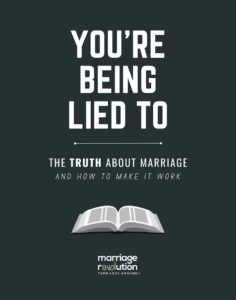When I discovered Star was having an affair just 18 months into our marriage I was distraught. I could barely contain the rage and anger. The thought of my wife being with another man made me want to vomit, scream, crawl in a hole, and lash out in anger….all at the same time. I never thought I would forgive her.
I didn’t think I, much less my marriage, would ever recover.
But, not only did God restore me, he restored my marriage as well. And, “restore” is an understatement. God made my marriage stronger than it ever was before and the intimacy and closeness my wife and I now share is almost unbelievable given what we went through.
How did this happen? Forgiveness was a key ingredient.
Regardless of what you’ve been through in your marriage, you’ve undoubtedly been put in a position of to forgive your spouse. Ruth Graham said, “A great marriage consists of two great forgivers.” The best marriages are the best at forgiveness.
A great marriage consists of two great forgivers.
Ruth Graham
Some opportunities to forgive are harder than others, but regardless of what your spouse has done to you…forgiveness is possible! It might not happen overnight, and it will likely take personal work and a community of people around you, but you can forgive your spouse.
There is hope!!
How To Forgive Your Spouse
Here are 12 thoughts to consider if you’re struggling with forgiving your spouse.
- Forgiveness is a miracle of God – Any good that comes from our hearts is not of us, but rather a gift from God (James 1:17). Struggling with forgiveness? Of course, you are. It isn’t of you. It can’t be. It can only happen because God works a miracle in your heart. Forgiveness always starts by acknowledging this and asking him for help.
- Forgiveness takes time – Sometimes, forgiveness happens quickly, but other times, it doesn’t, especially in response to being sinned against in an extreme or repetitive way. It is unrealistic to expect all the hurt, pain, and bitterness that resulted from a particular event(s) to be gone overnight. Many times, the pain of being sinned against has to be processed and talked about before you can say, “I forgive you.” This is okay! If you rush saying I forgive you, you might short-circuit the healing process necessary to reconcile the relationship fully.
- Forgiveness doesn’t make all the pain disappear – I’ll repeat it; saying “I forgive you” doesn’t make the pain disappear. When the recurrences of pain happen, let that alert you that more healing and reconciliation must occur. Frequently, many redemptive conversations must occur over time to experience complete healing, forgiveness, and reconciliation. As thoughts of hurt and betrayal spring up occasionally, don’t try to forget them; try to work through them. Forgiveness and reconciliation is our goal, not forgetting what’s happened to you. Share your pain with the Lord and ask for comfort, healing, and possibly forgiveness (if you’re holding on to the pain or if you’re unwilling to work through the pain). Then, share these thoughts with your spouse. This could look like saying, “I’m struggling with thinking about…..would you pray for me?” Again, don’t share with a motive of throwing it in their face, but rather allow them to be used by God to help comfort you. Healing, forgiveness, and reconciliation talk about the past in a redemptive way with God and others and don’t stuff it away, never to be talked about again.
- Forgiveness doesn’t equal reconciliation but it is required for reconciliation to take place – Saying, “I forgive you” is a step in the reconciliation process, but it doesn’t equal reconciliation. Conversely, reconciliation isn’t possible without forgiveness. Don’t rush forgiveness, but always be moving in the direction of forgiveness.
- Forgiveness has a goal of reconciliation but doesn’t require it– Although forgiveness is a step in the restoration process, it doesn’t always equal restoration. We are called to live at peace with our spouse as far as it depends on us (Romans 12:18). Forgiveness takes one person (you), but restoration of the relationship takes both of you. Forgiveness is not being a doormat or a punching bag. Nor does it turn a blind eye to sin. This isn’t an excuse to move towards separation or divorce hastily or recklessly. Still, it is an understanding that you can only do so much to accomplish the restoration of the marriage. Continuously pursue restoration, but remember it takes two to make it complete.
- Forgiveness doesn’t automatically rebuild trust – Forgiveness is an event, but rebuilding trust is a process. If your spouse has hurt you, especially in a significant way, it wouldn’t be wise to trust them right away completely. Trust is lost in a moment, but it takes 10,000 moments to rebuild. That’s unfortunate but true. Healing from the pain leads to forgiveness. Forgiveness leads to reconciliation. Reconciliation plus your spouse’s consistently changed behavior over time leads to rebuilding trust.
Trust is lost in a moment, but it takes 10,000 moments to rebuild.
- Receiving forgiveness precedes granting forgiveness– Forgiveness isn’t something you do as much as it is something you receive and then give away. Forgiveness isn’t yours to hold on to and give away if and when you feel like it. It is something given to you freely by God with a responsibility attached to it – to give it away freely (Matt 10:8). You have been forgiven so you can, in turn, go and forgive your spouse (Eph 4:32). Your struggle to forgive your spouse is an indication that you don’t understand how much you’ve been forgiven (Luke 7:47). When you understand the extent of the gift of forgiveness given to you, you will be much more willing to extend that gift to your spouse. Experiencing God’s forgiveness is the foundation of extending forgiveness to your spouse. Forgiven people forgive people.
The failure to forgive reveals an unforgiving heart and an unforgiven heart.
Tim Lane
- Oneness and unforgiveness are completely incompatible in marriage – When your spouse hurts you, they put a relational brick between you. Even one brick of unresolved hurt hinders you and your spouse from experiencing oneness. Completely removing the brick is required for oneness to be restored and requires work on both sides of the relationship. Getting rid of the brick requires you to heal from the hurt and forgive the hurt, and requires both of you to work towards reconciliation. Although you aren’t the only one necessary for restoration, you are responsible for doing your part by pursuing healing for yourself and forgiving your spouse. Unforgiveness and marriage don’t work.
- Forgiveness is about past events, not the future – Don’t withhold forgiveness of past events for fear of being hurt in the future. One of the goals of forgiveness is to create the best possible environment for your spouse to experience repentance or change. And, the best possible environment for change is one filled with kindness (Romans 2:4). When you withhold forgiveness or kindness, for fear of repeated sinful behavior, your lack of love may end up having the opposite effect you desire…a lack of future change.
- Initiate forgiveness regardless of who is more at fault– There are certain situations where you are being sinned against more than you are sinning against your spouse. But that isn’t justification to delay extending forgiveness. As the offended party, you must imitate Christ and initiate forgiveness with your spouse regardless of who’s more at fault. The truth is that we all need the same amount of God’s amazing grace all the time (1 Tim 1:15).
It is impossible to forgive someone if you feel superior to him or her.
Tim Keller
- Forgiveness gives up the right to seek revenge, or show wrath towards our spouse – You will experience triggers that remind you of what happened to you and lead you to experience more pain and hurt. Be careful not to let the repeated pain lead you to re-hash the past or to use your spouse’s past sin against them. Being sinned against doesn’t justify sinning against someone. Although it is very tempting to retaliate, the Bible clearly says retaliation and judgment are reserved for God himself. The reason we struggle with wanting to take this into our own hands is because we don’t trust that God will do his job (Rom 12:19).
Forgiveness means we give up the right to punish the other person.
Ruth Graham
- The Ultimate Goal of Forgiveness – Star will frequently say that my forgiveness and pursuit of her during this season of our lives taught her more about Christ’s forgiveness than anything else. Star’s experience highlights the focus and central motive of extending forgiveness to your spouse…Christ. Giving forgiveness to your spouse reflects and points to Christ’s forgiveness for both of you – and that’s the ultimate goal. Extending forgiveness is all about pointing your spouse to the ultimate forgiver – Jesus Christ. And remember, regardless of what your spouse has done to you, as a believer in Christ, your spouse’s sin has been forgiven and the penalty of their sin has been paid.

Hans co-founded Marriage Revolution with his wife, Star, in 2010. He counsels couples in The Woodlands, TX, speaks at marriage conferences around the country, and provides leadership and direction to Marriage Revolution.










